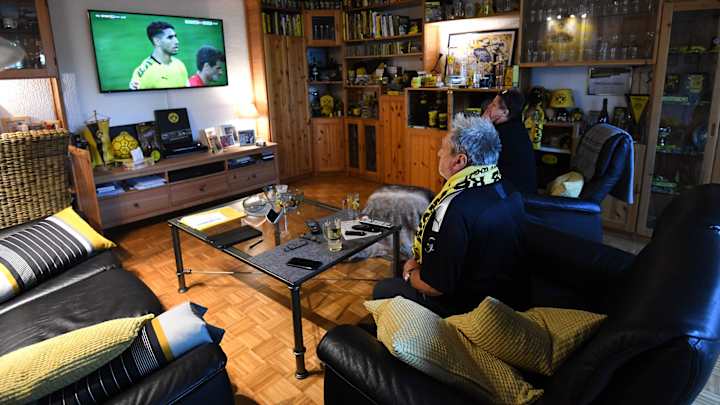Fake Crowd Noise on Soccer Broadcasts Provides Comfort, But It's Disingenuous

There might not be a sporting soundtrack in the world as unique as the Bundesliga's. Fervent fandom and pageantry can be found elsewhere, but there's something markedly different about those features in Germany.
So it's understandable, then, that television networks and those in control of world feeds would want to replicate that as much as possible for the broadcasts of Bundesliga matches that are taking place in empty stadiums as a result of the coronavirus pandemic. The use of fake fan noise has been prevalent on TV since the German league returned, and even if it's creating a bit of an alternate reality, it's a measure being taken to soften the blow of these extraordinary times to fans at home. If it's jarring to the eye, it doesn't also have to be jarring to the ear.
One could argue that it enhances the broadcasts, that it makes it feel like a "normal" presentation. There's a comfort and familiarity that comes with hearing fan noise in the background, and that rings especially true for those watching passively. Look down at your phone, tablet or laptop, walk into the kitchen to get a drink, and there's a second-nature quality to the sound.
The commendable work being done by the sound engineers to sync fake crowd mood with moments in the match should not be overlooked either. It's all quite impressive, really, to hear "home fans" jeer and whistle after a loss or a suspect call. It doesn't at all sound out of place.
Only it's all disingenuous. There's no need to paper over what's happening. Clubs are playing in empty stadiums because of a pandemic that has claimed hundreds of thousands of lives and impacted millions of others. That fact is not going ignored in Germany, where a meticulous plan to return and the actions of national and local government are the only reasons these games are happening in the first place and where clubs are regularly observing a pregame, socially distanced moment of silence out of respect.
So why are we pretending like it's business as usual on the broadcast when these times are anything but that? In this alternate reality, having artificial fan noise blared through the speakers is just plain weird. For all of the sentiment from clubs and players about fans being irreplaceable, the use of technology has effectively countered that. There's a bit of a disconnect on the broadcast, too, when announcers are talking about the sounds from the field and bench and the fan-less atmosphere all while manufactured noise is being piped through to the viewers at home.
If there's a uniqueness that falls on the "pro" side of the pro-con checklist that comes with the current circumstances, it's being able to hear what's happening on the field in realtime. It's rare to hear so much communication between players, so much instruction from managers, so much commotion between players and officials, so much of the actual sounds of the game. Broadcasts are supposed to depict what's happening and relay that authentically to the viewer. If a game that generally produces one of the most fierce atmospheres in the world is being played in front of a silent backdrop, that's as much a part of the story as the result.
Take the Associated Press's recap from Bayern Munich's win over Dortmund on Tuesday, for instance: "It was an eerily quiet meeting between the Bundesliga rivals as the shouts from players and coaches, and the thud of the ball being kicked around, could be heard clearly in Dortmund’s almost-empty 80,000-capacity Westfalenstadion."
Not for those whose broadcast or streaming options peppered the proceedings with fan chants that never happened.
Make no mistake, this is a time for ingenuity. What some clubs are doing to connect with their fans or to augment the experience for viewers who are otherwise more limited than usual has been tremendous. There's Bayer Leverkusen, which printed a banner of fan-submitted photos to cover the central section of the lower bowl of the BayArena that occupies valuable real estate on broadcast feeds. There's Borussia Monchengladbach, which sold plastic cutouts of fans for charity and filled 13,000 seats in its first home match.
It goes beyond Germany. In Denmark, for example, AGF Aarhus is designing a system for fans to virtually attend its return match vs. Randers on Thursday via Zoom, with screens set up inside the stadium. Another Danish club, Midtjylland, is setting up a drive-in movie theater experience outside its stadium, where about 2,000 cars can be as physically close to the action as possible without being inside the stadium.
In South Korea, FC Seoul ... well, not all ideas are winners.
There are clearly ways to bridge the gap between empty stadiums and the difficulties replicating the fan experience, though. Faking fan noise to create a parallel universe doesn't have to be one of them.
This is just an opinion, of course. If you enjoy it, then continue enjoying it. Nitpicking about an element of a broadcast for games we're fortunate enough to have take our attention might be a bit much. Artificial crowd noise is far from the greatest offense that could be committed–it's not like it's happening inside the stadium, impacting the players–and there's clearly a camp that appreciates it. Everything else these days feels like an alternate reality, anyway.

Avi Creditor is a senior editor and has covered soccer for more than a decade. He’s also a scrappy left back.